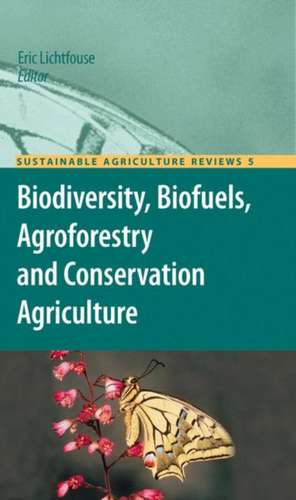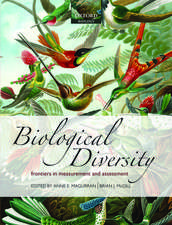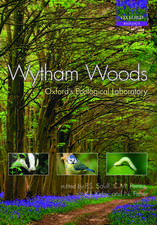Biodiversity, Biofuels, Agroforestry and Conservation Agriculture: Sustainable Agriculture Reviews, cartea 5
Editat de Eric Lichtfouseen Limba Engleză Hardback – 6 oct 2010
| Toate formatele și edițiile | Preț | Express |
|---|---|---|
| Paperback (1) | 949.42 lei 6-8 săpt. | |
| SPRINGER NETHERLANDS – 5 dec 2012 | 949.42 lei 6-8 săpt. | |
| Hardback (1) | 955.56 lei 6-8 săpt. | |
| SPRINGER NETHERLANDS – 6 oct 2010 | 955.56 lei 6-8 săpt. |
Din seria Sustainable Agriculture Reviews
- 24%
 Preț: 783.49 lei
Preț: 783.49 lei - 15%
 Preț: 652.49 lei
Preț: 652.49 lei - 15%
 Preț: 641.71 lei
Preț: 641.71 lei - 18%
 Preț: 953.65 lei
Preț: 953.65 lei - 15%
 Preț: 648.24 lei
Preț: 648.24 lei - 5%
 Preț: 1106.69 lei
Preț: 1106.69 lei - 5%
 Preț: 1110.32 lei
Preț: 1110.32 lei - 18%
 Preț: 955.25 lei
Preț: 955.25 lei - 18%
 Preț: 1233.83 lei
Preț: 1233.83 lei - 18%
 Preț: 1123.35 lei
Preț: 1123.35 lei - 18%
 Preț: 1115.46 lei
Preț: 1115.46 lei - 18%
 Preț: 1117.03 lei
Preț: 1117.03 lei - 18%
 Preț: 1387.73 lei
Preț: 1387.73 lei - 18%
 Preț: 1222.80 lei
Preț: 1222.80 lei - 18%
 Preț: 1113.09 lei
Preț: 1113.09 lei - 18%
 Preț: 903.93 lei
Preț: 903.93 lei - 18%
 Preț: 1114.65 lei
Preț: 1114.65 lei - 18%
 Preț: 1223.11 lei
Preț: 1223.11 lei - 24%
 Preț: 1056.88 lei
Preț: 1056.88 lei - 18%
 Preț: 1234.00 lei
Preț: 1234.00 lei - 20%
 Preț: 565.09 lei
Preț: 565.09 lei - 18%
 Preț: 1826.54 lei
Preț: 1826.54 lei - 18%
 Preț: 952.89 lei
Preț: 952.89 lei - 18%
 Preț: 955.08 lei
Preț: 955.08 lei - 18%
 Preț: 950.96 lei
Preț: 950.96 lei - 15%
 Preț: 649.71 lei
Preț: 649.71 lei - 18%
 Preț: 954.62 lei
Preț: 954.62 lei
Preț: 955.56 lei
Preț vechi: 1165.32 lei
-18% Nou
Puncte Express: 1433
Preț estimativ în valută:
182.90€ • 198.74$ • 153.74£
182.90€ • 198.74$ • 153.74£
Carte tipărită la comandă
Livrare economică 21 aprilie-05 mai
Preluare comenzi: 021 569.72.76
Specificații
ISBN-13: 9789048195121
ISBN-10: 9048195128
Pagini: 400
Ilustrații: VI, 394 p.
Dimensiuni: 155 x 235 x 28 mm
Greutate: 0.74 kg
Ediția:2011
Editura: SPRINGER NETHERLANDS
Colecția Springer
Seria Sustainable Agriculture Reviews
Locul publicării:Dordrecht, Netherlands
ISBN-10: 9048195128
Pagini: 400
Ilustrații: VI, 394 p.
Dimensiuni: 155 x 235 x 28 mm
Greutate: 0.74 kg
Ediția:2011
Editura: SPRINGER NETHERLANDS
Colecția Springer
Seria Sustainable Agriculture Reviews
Locul publicării:Dordrecht, Netherlands
Public țintă
GraduateCuprins
1. Agroecology as a transdisciplinary science for a sustainable agriculture; Fabio Caporali. 2. Measuring agricultural sustainability; Dariush Hayati3. Sustainable bioenergy production, land and nitrogen use; Enrico Ceotto4. Biofuels, the role of biotechnology to improve their sustainability and profitability; Meenu Saraf5. Challenges and opportunities of soil organic carbon sequestration in croplands; Ilan Stavi6. Conservation agriculture under mediterranean conditions in Spain; Felix Moreno7. Conservation tillage and sustainable agriculture in semi-arid dryland farming; Mohammad Zarea8. Synergism among crops to improve dryland crop production; Randy Anderson9. Sustainable irrigation to balance supply of soil water, oxygen, nutrients and agro-chemicals; Surya Bhattarai10. Agricultural practices in northeast India and options for sustainable management; Awadhesh Kumar Shukla11. Microbial community structure and diversity as indicators for evaluating soil quality; Sushil K. Sharma12. Integrating silvopastoralism and biodiversity conservation; Rosa Mosquera
Recenzii
From the reviews:
“This is a useful wide-ranging book covering many areas of interest to the thinking agriculturalist of the 21st century operating on a global scale. … It includes a section on argo-ecology in the curriculum that educationalists will find of interest. The book is well referenced throughout as one has come to expect from the series and it is a useful addition to its partner volumes.” (Keith Dawson, Experimental Agriculture, Vol. 47 (4), 2011)
“This is a useful wide-ranging book covering many areas of interest to the thinking agriculturalist of the 21st century operating on a global scale. … It includes a section on argo-ecology in the curriculum that educationalists will find of interest. The book is well referenced throughout as one has come to expect from the series and it is a useful addition to its partner volumes.” (Keith Dawson, Experimental Agriculture, Vol. 47 (4), 2011)
Textul de pe ultima copertă
Sustainable agriculture is a rapidly growing field aiming at producing food and energy in a sustainable way for humans and their children. Sustainable agriculture is a discipline that addresses current issues such as climate change, increasing food and fuel prices, poor-nation starvation, rich-nation obesity, water pollution, soil erosion, fertility loss, pest control, and biodiversity depletion. Novel, environmentally-friendly solutions are proposed based on integrated knowledge from sciences as diverse as agronomy, soil science, molecular biology, chemistry, toxicology, ecology, economy, and social sciences. Indeed, sustainable agriculture decipher mechanisms of processes that occur from the molecular level to the farming system to the global level at time scales ranging from seconds to centuries. For that, scientists use the system approach that involves studying components and interactions of a whole system to address scientific, economic and social issues. In that respect, sustainable agriculture is not a classical, narrow science. Instead of solving problems using the classical painkiller approach that treats only negative impacts, sustainable agriculture treats problem sources. Because most actual society issues are now intertwined, global, and fast-developing, sustainable agriculture will bring solutions to build a safer world. This book series gathers review articles that analyze current agricultural issues and knowledge, then propose alternative solutions. It will therefore help all scientists, decision-makers, professors, farmers and politicians who wish to build a safe agriculture, energy and food system for future generations.
Caracteristici
Presents a list of advanced biofuels to counter climate change Gives a list of farming practices that favour carbon sequestration Describes several methods of conservation tillage to improve dryland soils Includes supplementary material: sn.pub/extras











